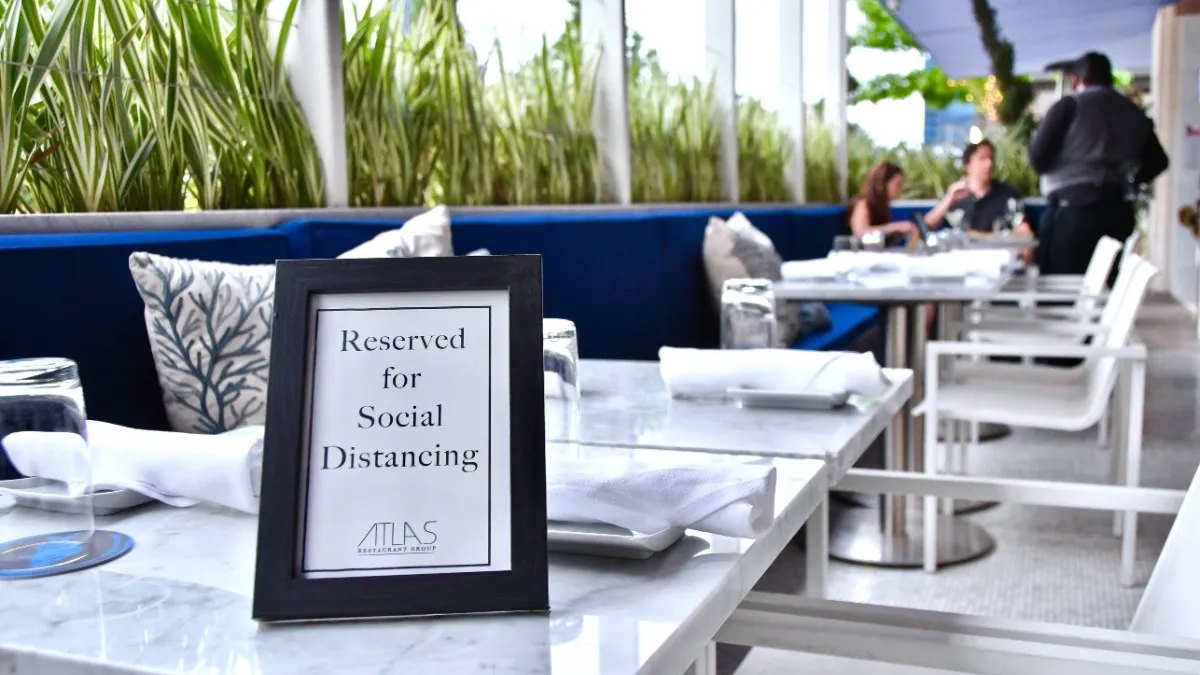At the start of 2020, layoffs were farthest from the minds of Alex and Eric Smith, co-owners of Atlas Restaurant Group. But at the height of the novel coronavirus pandemic, the two brothers — who were expecting an $85 million revenue year — had to furlough over 900 of its 1,000 employees.
"It put me and my brother in tears, and it's the saddest thing I ever had to do," Alex Smith told HR Dive sister publication Restaurant Dive. "Our goal is survival and our goal is to get our Atlas family back to work."
The company temporarily closed 14 of its 15 full-service restaurants, a bulk of which are in Baltimore. Despite the furloughs, the Smith brothers kept in contact with its employees.
Alex, Eric and the management team called their hourly workers each week to check in, Alex Smith said. They also held weekly grocery giveaways to everyone in the Baltimore hospitality industry and raised money for gift cards for their hourly employees, which the two owners personally matched.
"We [were] doing things to try and basically keep the engagement going with our employees," Alex Smith said.
These relationships may have helped particularly with retention. Smith said he expects his back-of-house and management teams to return in full, and only about 20% of his front-of-house isn't expected to return. The company began bringing back employees in mid-May when the restaurant reopened with carryout and transitioned to a limited menu. The company opened its outdoor space in late May, and has already brought back over 500 staff members. With Baltimore expected to reopen dining rooms in the coming weeks, Smith said he expects over 700 to be back on the job.
During the pandemic, communication patterns from the top down evolved given the fast pace of information coming out, pushing restaurants to have greater transparency and clearer employee messaging. Maintaining relationships with employees has been important for retention and is vital as employees return to the workplace and learn new safety policies and procedures.
How COVID-19 strengthened communication with employees
Throughout the pandemic, several restaurant operators have been having Zoom calls with managers, who then reach out to their employees to check in via phone calls, text messaging or emails, Bob Duprey, founder of e-learning website RestaurantPlaybook.com, told Restaurant Dive. Over the last few months, Duprey has worked with operators on transitioning to curbside/takeout and how to reopen if they were previously closed.
Companies recognize that it is good to go beyond work-related communication and check on how employees are doing, Duprey said.
"It's more about that it's the right thing to do to just check in and see how folks are doing and keep those lines of communication open," Duprey said.
Early on when restaurants began closing as COVID-19 cases increased across the country, &pizza increased wages, provided affordable transportation via Lyft, extended sick pay coverage and offered several other benefits. This helped the chain retain 90% of its workforce, including at the corporate level, Michael Lastoria, CEO of &pizza, said during a Restaurant Rise webinar in June.
"We've always thought of communication as extremely important. Transparency is extremely important to me. So we've just doubled down on the communication."

Denyelle Bruno
CEO, Tender Greens
"You're the first one to say, 'Hey, I'm going to invest in you, not just when times are good. I'm going to simultaneously invest in you when times are very difficult,'" Lastoria said.
The pizza chain sent text messages four to five times a day because mobile phones are a platform employees feel most comfortable responding to, Lastoria said. Every employee also has Lastoria's cell phone number.
"If you ever played the game of telephone as a kid, you know very quickly that messages from one person to another to another … gets convoluted along the way, not because of bad intentions — it's just the nature of these things," he said.
Direct communication allows &pizza to keep its ears to the ground to help shape and enact policy going forward, Lastoria said.
D.C.-based Farmers Restaurant Group has maintained continuous communication with its employees as well, which has included twice as much listening, founder Dan Simons told Restaurant Dive. He's heard stories about people who have sick relatives or were sick themselves during the pandemic, and about ones that are under financial stress and distress and many who have been fearful.
Simons said he's talking as much as possible with his team and finding ways to discuss different issues, including the protests against systemic racism that began in late May.
"For anybody who has a team or is part of a team, I think that's the fortunate part because we're not built to be alone. … And then add in all the injustice and racial strife, and these are times when people need each other," he said.
How communication is changing at the corporate level
Better communication is also occurring at the corporate level. Management teams are facilitating more daily conversations and some companies created task forces with members of different departments to make sure that everyone is on the same page. Inspire Brands, for example, created a cross-functional task force in March to help keep team members and franchisees informed and prepared.
Pre-COVID-19, Denyelle Bruno, CEO of Tender Greens, would have weekly check-ins and use email and Slack to communicate with her team, but during the pandemic she and her coworkers moved to a verbal communication system. They had check-ins in the morning and one at the end of the day to stay connected to one another, she said during the Restaurant Rise webinar.
"Things were moving at the speed of light, and we didn't want to wait to set up meetings for a week in advance to make sure we were dealing with the 10 things that happened the day before," she said. "We've always thought of communication as extremely important. Transparency is extremely important to me. So we've just doubled down on the communication."
New England Authentic Eats, parent company of Papa Gino's and D'Angelo's Grilled Sandwiches, created a task force toward the end of February that meets seven days a week, CMO Deena McKinley told Restaurant Dive. It includes representatives from different departments including operations, marketing and finance.
The task force has discussed everything from how to handle different policies across municipalities about who is required to wear masks to how to deploy social distancing measures inside restaurants for guests that come in to pick up their orders.
Different operations representatives helped the company figure out what each department needed and rolled out new policies through an online training program, she said.
"The task force has been a really important part of our daily operation and our ability to react as quickly as we're reacting to all of these things," McKinley said.
Working closely with employees during reopening
When implementing new policies, managers need to be clear with employees on what is expected, Joel Staley, senior communications executive and media trainer at JCS Communication, told Restaurant Dive. Staley specializes in crisis communication.
Internal apps, emails, internal websites, electronic bulletin boards should be used to help notify employees of changes, Staley said.
There should also be clear physical signage in worker areas providing guidelines to follow to ensure they are delivering the ideal level of customer service and safety during the pandemic, Staley said. Management should also model the correct behavior they expect their employees to exhibit, he said. If workers need to wear masks at all times, then a manager should too, for example.
Some restaurants are assigning one or two people per shift dedicated to enforcing some of these policies. This has already led to new roles like concierges to ensure guests follow safety standards and safety stewards that act as a point person regarding COVID-19 protections.
Designating employees to be visibly cleaning also provides assurances to guests.
"It's about having a process and procedures in place, having the training for the right people in the right roles to do it, and then having someone every day kind of managing that process," Duprey said.
Training can't be like food safety or alcohol certifications that need to be done every three to five years either, he said. These new behaviors are going to need to be constantly reinforced, especially since wearing a mask or keeping distance from guests is atypical in the industry. But these behaviors will be increasingly important, especially as customers have grown to expect certain safety precautions.
"Safety is like the new hospitality," Duprey said.
Customers, who could enjoy the food and the experience, but see an employee wipe their nose or not wear a mask, might not return, Duprey said.
"It's going to be game over," Duprey said. "And so that's why it's so important to look at things a little bit differently and how you support those behaviors."
"Safety is like the new hospitality."

Bob Duprey
Founder, RestaurantPlaybook.com
Alex Smith of Atlas Restaurant Group said he has an open-door policy to talk with employees about safety procedures, especially those who might be reticent about coming back to work during the pandemic. The company is following all the CDC, federal and state guidelines, and is doing temperature checks and requiring employees to wear masks and gloves during their shifts, he said. But there have been some employees who don't feel comfortable about coming back, even to get training.
"Nobody's obviously forced to come back to work if they choose not to work," Smith said. "But it's allowed us to basically find out the people who are eager to get back to work."
Alex Smith said these employees have had no trouble following the company's safety guidelines. He has walked through all of the company's properties and not seen any employee without a mask over their mouth and nose.
"Everybody on our staff understands the seriousness of this and how vital it is that that's the way we have to operate going forward," he said.
And seeing employees on the job has only brought Smith joy.
"It feels great. I'll tell you I've been on the ground every day talking to every single employee. I've elbow bumped every server and elbow bumped every dishwasher welcoming them back," Smith said.























